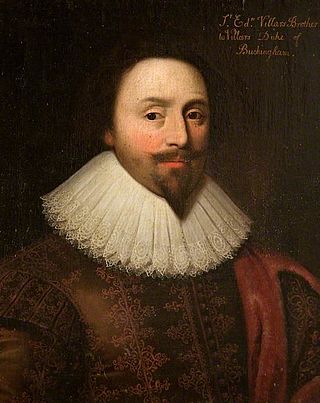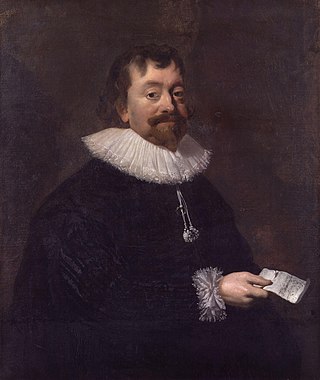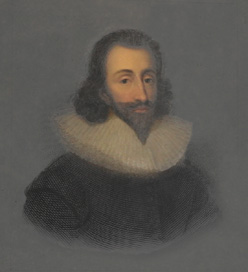
Charles I was King of England, Scotland, and Ireland from 27 March 1625 until his execution in 1649.

The Petition of Right, passed on 7 June 1628, is an English constitutional document setting out specific individual protections against the state, reportedly of equal value to Magna Carta and the Bill of Rights 1689. It was part of a wider conflict between Parliament and the Stuart monarchy that led to the 1639 to 1653 Wars of the Three Kingdoms, ultimately resolved in the 1688–89 Glorious Revolution.
The Personal Rule was the period in England from 1629 to 1640 when King Charles I ruled as an autocratic absolute monarch without recourse to Parliament. Charles claimed that he was entitled to do this under the royal prerogative and that he had a divine right.
Tonnage and poundage were English duties and taxes first levied in Edward II's reign on every tun (cask) of imported wine, which came mostly from Spain and Portugal, and on every pound weight of merchandise exported or imported. Traditionally tonnage and poundage was granted by Parliament to the king for life, but this practice did not continue into the reign of Charles I. Tonnage and poundage were swept away by the Customs and Excise Act 1787.

John Finch, 1st Baron Finch was an English judge, and politician who sat in the House of Commons at various times between 1621 and 1629. He was Speaker of the House of Commons.
In English law, poundage was an ad valorem customs duty imposed on imports and exports at the rate of 1 shilling for every pound of goods imported or exported.
The Fire and Faggot Parliament was an English Parliament held in May 1414 during the reign of Henry V. It was held at Greyfriars in Leicester, and the Speaker was Walter Hungerford. It is named for passing the Suppression of Heresy Act 1414, which called for burning the Lollards with bundles of sticks ("faggots").
that whoever should read the Scriptures in Englishshould forfeit land, cattle, goods, and life, and be condemned as heretics to God, enemies to the crown, and traitors to the kingdom; that they should not have the benefit of any sanctuary, though this was a privilege then granted to the most notorious malefactors; and that, if they continued obstinate, or relapsed after pardon, they should first be hanged for treason against the king, and then burned for heresy against God.

The Cádiz expedition of 1625 was a naval expedition against Spain by English and Dutch forces. The plan was put forward because after the Dissolution of the Parliament of 1625, the Duke of Buckingham, Lord High Admiral, wanted to undertake an expedition that would match the exploits of the raiders of the Elizabethan era and in doing so, would return respect to the country and its people after the political stress of the preceding years. It was a major fiasco resulting in a Spanish victory.
Events from the 1620s in England. This decade sees a change of monarch.

Sir Edward Villiers was an English nobleman from Leicestershire and member of the Villiers family, whose younger half-brother George Villiers, 1st Duke of Buckingham, was a favourite of both James VI and I and his son Charles. Through his influence, Sir Edward gained various positions, including Master of the Mint, Member of Parliament for Westminster and Lord President of Munster. He died in Ireland in September 1626.
Sir Francis Barrington, 1st Baronet of Barrington Hall, Essex was a Puritan activist and politician, who was MP for Essex from 1601 to 1604, then 1620 to 1628.

Sir Robert Phelips was an English politician who sat in the House of Commons at various times between 1604 and 1629. In his later Parliaments he was one of the leading spirits in the House of Commons and an opponent of James I, Charles I and their adviser Buckingham.

William Coryton (1580–1651) of West Newton Ferrers, St Mellion, Cornwall, was a Cornish gentleman who served as MP for Cornwall in 1624, 1626 and 1628, for Liskeard in 1625, for Grampound in 1640 and for Launceston 1640–41. He was expelled from Parliament for falsifying returns.

The Loyal Parliament was the only Parliament of England of King James II, in theory continuing from May 1685 to July 1687, but in practice sitting during 1685 only. It gained its name because at the outset most of its members were loyal to the new king. The Whigs, who had previously resisted James's inheriting the throne, were outnumbered both in the Commons and in the Lords.
Benjamin Valentine, was an English politician and Member of Parliament.

The Second Parliament of Charles I was summoned by Charles I of England on 26 December 1625 in another attempt to solve his growing monetary problems.

Sir John Eliot was an English statesman who was serially imprisoned in the Tower of London, where he eventually died, by King Charles I for advocating the rights and privileges of Parliament.

Sir Andrew Corbet (1580–1637) of Moreton Corbet, Shropshire, was an English politician who sat in the House of Commons at various times between 1624 and 1629. A Puritan sympathiser, he at first supported the government but became an increasingly vocal opponent of King Charles I's policies and ministers.
This is a timeline of events leading up to, culminating in, and resulting from the Wars of the Three Kingdoms.

The 3rd Parliament of King Charles I was summoned by King Charles I of England on 31 January 1628 and first assembled on 17 March 1628. The elected Speaker of the House of Commons was Sir John Finch, the Member of Parliament for Canterbury.










